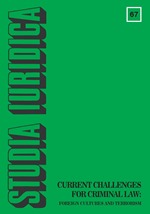Przyczynek do rozróżnienia niedbalstwa i niedbałości w prawie karnym.
A contribution to the distinction between negligence and carelessness in criminal law
Author(s): Andrzej FronczakSubject(s): Essay|Book Review |Scientific Life
Published by: Wydawnictwa Uniwersytetu Warszawskiego
Keywords: ustawy karne - wina umyślana i wina nieumyślna w polskim prawie karnym; postaci winy w polskim prawie karnym; niedbalstwo i niedbałość;
Summary/Abstract: The article is devoted to the distinction between negligence and carelessness in criminal law. Negligence refers to the issue of the subjective basics of criminal liability and is a form of unintentional guilt when the offender was not aware and willing to commit a prohibited act. Carelessness, however, is concerned with action and is defined as a specific way of behaviour which combines elements of lack of care, accuracy, diligence, improper fulfillment of entrusted activities or simple sloppiness. In presented sense the role of carelessness and negligence on the basis of the rules of criminal responsibility will vary and run out at two distinct levels of the structure of the offense. Carelessness is supremely important when assessing the unlawfulness of the criminal act committed intentionally. Negligence, however, accesses the level of the blame which is put down to the offender and never goes beyond inadvertence. Actions from the doer fall under the category of carelessness, while actions from the deed may be committed either intentionally or unintentionally.
Journal: Studia Iuridica
- Issue Year: 2011
- Issue No: 53
- Page Range: 97-113
- Page Count: 17
- Language: Polish

